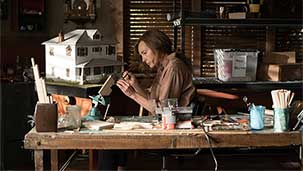Each of us have expansive and multidimensional inner lives, aspects of which we very rarely share with anyone. Often the only people who might get a glimpse are those closest to us – our family. Our smaller, exterior lives are lived together, around the dinner table, in the car, during awkward social functions like parties or funerals, places where we cling to one another for some semblance of comfort despite whatever internal discord we may be experiencing.
In Hereditary, these familial connections - their strengths and terrifying weaknesses - are the tenuous thread holding together a family struggling with grief and sorrow. This is a family on the brink of destruction, dealing with forces beyond their control, whose metaphorical demons are just as chilling as their literal ones.
Your doll house provides the first look at this family, as the camera moves in on a meticulously detailed miniature bedroom which then reveals itself to be the room of teenaged Peter, son of Steve and Annie, and big brother to Charlie. The camera widens to show us the real room, an immediately unsettling effect, hinting that what we are about to witness might be closer to the demented make-believe of a child than any reality we recognize.
Hereditary relies on tropes we’ve seen in horror films before – creepy kid, isolated house in the woods, ominous score, off-kilter art design including your dollhouses and miniatures – but lets them percolate while we focus on the spiritual center of the film, which is a family descending into despair. That something wicked will most certainly this way come is never disputed, but it’s the emotional pyrotechnics that are the most volatile in this house, practically bursting off the screen.
Annie is an artist who works in miniatures, constructing realistic dioramas that become increasingly morbid as she reckons with her losses. We learn of her fraught family history – a father and siblings who battled mental illness, an estranged and secretive mother – and her own difficulties grappling with motherhood to her teenaged son, Peter, and her tween daughter Charlie. As Annie, Toni Collette reminds us why she is one of the most unselfconscious and gifted actors of her generation. Hereditary lives and dies on the believability of a matriarch who is losing her grasp on reality, and clutching at what little hope she can find in her rapidly crumbling life. Her performance carries us through some of the less effective (and sometimes silly) narrative devices.
Hereditary is reminiscent of some of the most iconic 20th century horror films that deal with the super-natural and motherhood, like Rosemary’s Baby, The Exorcist, and even Poltergeist – slow-burning, character-driven thrillers that are more interested in developing a skin-crawling atmosphere, and pathos for their leads before hurtling them, and us, into the terrifying unknown. There are few jump scares, minimal gore, and some jaw-dropping narrative turns that even the most disaffected horror fans will find shocking. But there is also a disappointing rush to a brutal finish that is at worst, eye-rollingly incompatible with a film which, to this point, seemed uninterested in being just another horror movie.
But these are tiny quibbles that could fit into one of your tiny rooms. Hereditary is a kitchen-sink drama disguised as a horror film, employing the intensity of both genres to full effect. The larger themes outweigh the smaller contrivances, which, when assembled together constructed one of the most surprising films of the year so far.
Regards,
Di







